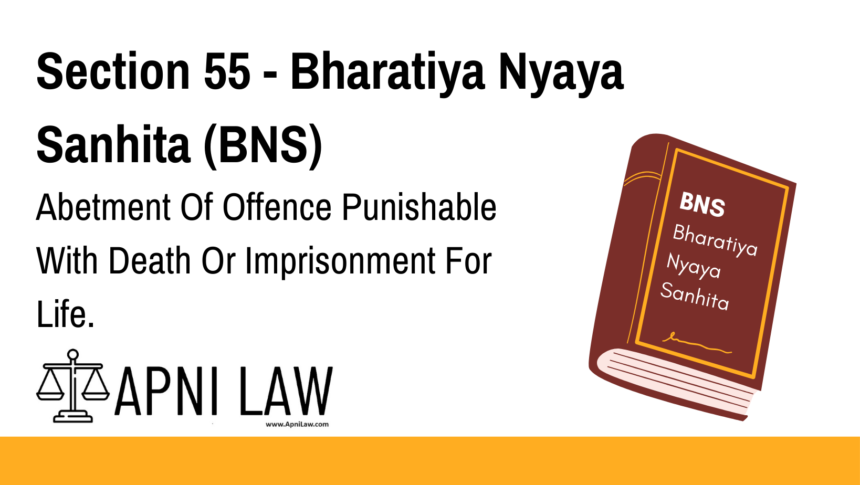Code: Exact Text of Section 55 BNS
Whoever abets the commission of an offence punishable with death or
imprisonment for life, shall, if that offence be not committed in consequence of the abetment,
and no express provision is made under this Sanhita for the punishment of such abetment, be
punished with imprisonment of either description for a term which may extend to seven
years, and shall also be liable to fine; and if any act for which the abettor is liable in consequence
of the abetment, and which causes hurt to any person, is done, the abettor shall be liable to
imprisonment of either description for a term which may extend to fourteen years, and shall
also be liable to fine.
Illustration.
A instigates B to murder Z. The offence is not committed. If B had murdered Z, he
would have been subject to the punishment of death or imprisonment for life. Therefore, A is
liable to imprisonment for a term which may extend to seven years and also to a fine; and if
any hurt be done to Z in consequence of the abetment, he will be liable to imprisonment for
a term which may extend to fourteen years, and to fine.
Explanation of Section 55 BNS
1. Understanding Abetment of Serious Offences
- Section 55 applies when a person abets a crime punishable with death or life imprisonment, such as murder, terrorism, or waging war against the state.
- It ensures that even if the crime is not committed, the abettor does not escape punishment.
2. Punishment under Section 55
- If the crime is NOT committed:
- Up to 7 years of imprisonment + fine.
- If an act causes “hurt” to someone:
- Up to 14 years of imprisonment + fine.
This section prevents abettors from escaping liability simply because their intended crime was not completed.
3. Key Elements of Section 55
- There must be an abetment of a serious offense (punishable by death or life imprisonment).
- The crime does NOT have to be committed for punishment to apply.
- If the act causes harm, the abettor faces a more severe penalty.
For additional clarity, refer to:
- Section 51 BNS – Liability of an abettor when a different act is done.
- Section 54 BNS – Liability of an abettor who is present at the crime scene.
Illustration of Section 55 BNS
Example from the Law
A instigates B to murder Z, but B does not commit the murder.
- Since B was supposed to commit a crime punishable with death/life imprisonment, A is liable to up to 7 years of imprisonment + fine.
- If B attacks Z (causing “hurt”) instead of murdering him, A is liable for up to 14 years of imprisonment + fine.
Common Questions and Answers on Section 55 BNS
1. What is the primary purpose of Section 55?
It ensures that people who incite others to commit serious crimes are still punished, even if the crime does not take place.
2. Does this section apply to minor offenses?
No. Section 55 applies only to abetment of serious crimes like murder, treason, or terrorism, which are punishable by death or life imprisonment.
3. What happens if the abettor is absent during the crime?
Even if the abettor is not physically present, they are still liable under Section 55 if they instigated, aided, or conspired to commit the crime.
4. What if the abettor later regrets their actions?
Mere regret is not enough to escape liability. However, if the abettor actively prevents the crime from happening, they may receive a reduced sentence.
5. How does Section 55 differ from other abetment laws?
- Section 51 BNS: Covers liability when a different act is done.
- Section 53 BNS: Covers liability when a different consequence occurs.
- Section 55 BNS: Ensures abetment of serious crimes is punished even if the crime is not completed.
Conclusion
Section 55 of the Bharatiya Nyaya Sanhita (BNS), 2023, prevents abettors from escaping the law by making them liable even if the offense is not committed. If the crime leads to injury, the punishment increases, ensuring strict legal accountability.
For more legal insights, visit ApniLaw today! 🚀











